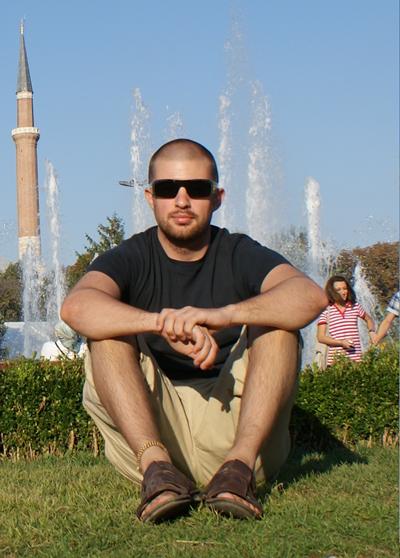Bradley Barnes BA History, MRes History

Hi, I'm Bradley Barnes and I studied BA History, MRes History within Humanities at the University of Southampton.
I have loved absolutely every minute of my degree programme. Not only has the programme allowed me to pursue a passion, it has also nurtured my own personal development, both as a ‘historian’ and as an individual.
Where were you born/ where did you grow up?
Southampton/Isle of Wight.
What was your first degree in? Where did you study it?
History at the University of Southampton.
What made you decide to study history at postgraduate level?
Continuing my studies in history to a postgraduate level was quite simply the pursuit of a passion, driven by the hope of becoming accomplished in something I love.
Why did you choose to study at Southampton?
As a child, walking past the University campus, I was always intrigued by what happened beyond the signs that read ‘University of Southampton’. In time I grew, and realised the signs represented excellence - a place well beyond the grasp of distinctly ordinary people such as myself. In August 2006, with my newly acquired A level certificates in hand, I realised that I had the opportunity to study at the University through the process of clearing - suddenly, Southampton and the prospect of excellence was no longer beyond my grasp. I’m glad to say that I decided to grab that opportunity and have never looked back.
Tell us more about the areas of history that you are now specialising in
From the scholarship of James Parkes at the beginning of 20th century to that of the more recent work of Daniel Boyarin, scholars of ecclesiastical history have looked to the fourth century as the period in which the communal boundaries between the Christian Orthodox 'self' and the so-called heresies of the non-Christian 'other' were decisively determined. Instigated by the conversion of the Emperor Constantine and the subsequent rapid and far reaching process of societal Christianisation, the question of ‘what constituted being Christian’ would serve to solidify communal boundaries between Christian and Jew, leading to their divergence and accordingly to their quite separate paths of evolution. As an understanding which derives from a specific base towards those communities of the Roman West, the question which has determined my postgraduate study is simple: to what extent can the scholar presume to apply this understanding to those communities living beyond the Roman sphere and beyond the impact of its politics? With this question in mind, my research has sought to study those considerable yet relatively ignored communities beyond the confines of Rome in the Sassanian East, where the Rabbinic community and that of its Christian contemporary would continue to share not only the same living space, but the same language and even the same ethnicity. Within this context, my research has sought to explore what happens to the notion of fourth century communal parting when one broadens the geographical scope to include those Christian and Jewish communities the Syriac Orient.
Are you enjoying your studies? What do you like most about your degree programme?
I have loved absolutely every minute of my degree programme. Not only has the programme allowed me to pursue a passion, it has also nurtured my own personal development, both as a ‘historian’ and as an individual. Having decided to take an MRes, the course is very much determined by your own research and your own programme of study. Your relationship with your lecturer is not so much one between teacher and pupil, but one between colleagues. It’s perhaps this relationship and academic context which I have liked the most, and have taken most from the MRes degree programme.
What’s the best thing about living and studying in Southampton?
It’s size. Big enough to have a few Starbucks, small enough to walk from end to end in no time.
What has been your favourite moment so far?
Graduation… without a doubt!
What are you planning on doing after graduating?
I have been fortunate enough to receive Arts and Humanities Research Council funding to complete a PhD. After that, we shall see.
Do you have any advice for people considering studying history at postgraduate level at Southampton?
Yes, do it part-time! Not only is it cheaper, it’s also a much more rewarding experience. Over two years you really are able to familiarise yourself with the source material of you special interest and slowly stew with it. Perhaps more importantly in these economically challenging times, it allows you to divert some of your attention to part-time work, reducing the pressure of economic strain and stresses.